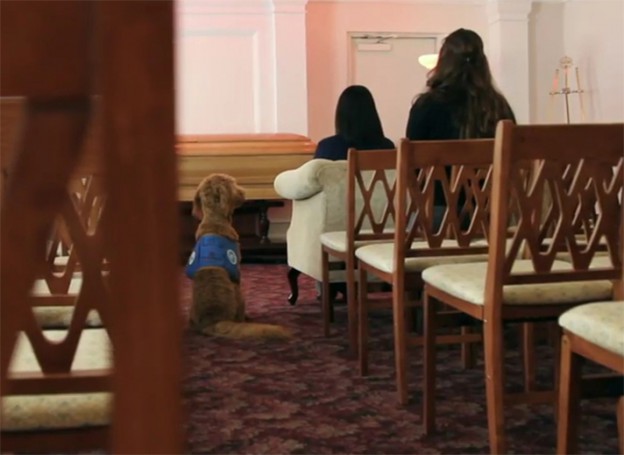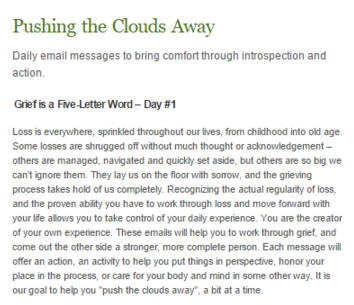9 Alternative (And Effective) Ways to Help Families Grieve
March 2nd, 2016
I just recently had to watch a close friend of mine grieve the death of her 1-year-old son. It was just about one of the hardest things I’ve ever had to watch.
The death wasn’t completely unexpected. The little boy had suffered from a rare disease that kept him hospitalized almost the entirety of his short life. But, it wasn’t something they were necessarily prepared for. Then again, is there ever really a good time for death to come knocking on our door?
In this day and age, the way that families grieve has changed dramatically from the Victorian ages, where we wore black mourning garments and kept our dead in our homes. And even within the last few years, grieving has become a much more social, open journey, with tons of alternative ways to grieve popping up right before our very eyes.
As more and more alternative healing options are making their way into our lives, I believe families are beginning to welcome the process of grieving more openly into their lives. Without further adieu, here are 9 awesome alternative ways to encourage your families to grieve:
1. Find presence with yoga
People may be surprised by how empowering it feels to peel themselves out of bed and force themselves onto a yoga mat when grieving the loss of their loved one. Seane Corn, a yoga teacher who teaches Yoga for a Broken Heart workshops all over the world, realized the impact yoga had on her grief journey after her father passed from cancer. “I can’t tell you how many times in the hospital room, watching my father die, I realized I was holding my breath. And I’d have to consciously stop, breathe, and feel,” she said in Yoga Journal. She added, “After my father died, the grief was so overwhelming that I would become hyper-reactive or numb… I realized you can’t just process heartbreak in your mind. You have to process it physically, too.”
There are Yoga Aftercare programs out there, so encourage families in your local community to check them out, or if you’re a funeral director or funeral home owner, perhaps you could even host your own.
2. Move and flow with Qoya Dance
Did you know the word “emotion” comes from the root word “mote” which means to move? In this way, the word “emotion” could be defined as the inability to move. Qoya, a type of healing dance created specifically for women, integrates breath, heart opening, hip opening, sun salutations, dancing and shaking to help women develop a sense of truth within them. The focus on heart and hip opening, our two major centers of emotional processing, give women the opportunity to bring movement and fluidity to the tension grief and anxiety can bring into the body. According to the Qoya website, one aspect of the dance which involves shaking the body helps “intentionally release what no longer serves us and reclaim our vibrant nature and zing!” Encourage families to try out Qoya classes near them by visiting their website.
3. Make new friends with Authentic Relating Games
When people are grieving, sometimes it feels like there is a large cloud of fog surrounding the topic of their loved one. They find they’re either avoiding the subject altogether, or they only want to talk about it until they feel a little better.
Authentic relating games is one of those techniques that helps people approach feelings like grief, depression and anxiety in a healthy and (surprisingly) authentic way. It’s not your typical board game night, but rather a “fun, highly interactive partner and group exercises that demonstrate and explore authentic relating, getting to know yourself better while at the same time learning to see and appreciate more about everyone you connect with,” according to the Authentic World website.
Authentic relating games offer up an opportunity for those who are grieving to be completely vulnerable and face any and all emotions that come up during conversation with complete authenticity. The best part about it? Gamers have empathetic, attentive friends and partners listening to them, providing a safe, supporting space as an alternative to group therapy. To find Authentic Relating community near your funeral home, check out Google or Facebook.
4. Work through feelings with a Grief Retreat
Sometimes in the midst of grief, people just want to get away from it all. A retreat can be a very productive way to find solstice. Instead of running away from emotions, these retreats offer those grieving the best of both worlds – a getaway AND and a way to face grief head on. All grief retreats are different in their own way, but the main goal of them is to create a relaxing, uplifting environment that inspires recovery and deep healing work. Some organizations to check out are
Awakenment Wellness and Crazy Good Grief.
Check out the video below to learn more about what people can expect from a grief retreat, as well as hear some customer testimonials that you can pass along to your families:

Source: Petcha
5. Lighten up the mood with a grief therapy dog
Have you ever been at an awkward event and had the presence of an animal lighten up the mood and spark conversation? Imagine the power a grief therapy dog has both at funeral services and during the stressful arrangement process. “I’ve been in the funeral business for 40 years and met with thousands of families. I have never seen anything that can put a smile on someone’s face in a time of distress like these dogs,” Jeff Herrmann from G.H. Herrmann Funeral Homes said about his funeral home’s grief therapy dogs. While some funeral homes have grief dogs permanently in their space, there are organizations who offer therapy dogs for all sorts of healing – both mental and physical.
6. EFT (Emotional Freedom Technique)
In Chinese and other Eastern medicines, it is believed that emotions such as grief, stress and depression are the root of all diseases. EFT, or Emotional Freedom Technique, borrows the Chinese meridian system (particularly acupuncture and acupressure) to heal the emotional, rather than physical body through the process of “tapping”. Paired with affirmations that help people work through their emotions, tapping allows people who are grieving to heal from within. According to Sonya Sophia’s EFT website, “ongoing preliminary research has shown that EFT seems to reduce the emotional impact of traumatic memories and incidents that trigger emotional distress and negative chemical reactions within the body.” If you want to learn more about this topic before introducing it to your families, check out this website to get started.
7. Practice positivity with affirmations
The most simple (and free) healing technique to overcome grief is the use of affirmations. Affirmations are short statements or mantras that people repeat to themselves in order to help them change their outlook on a difficult situation. The key, of course, is to “affirm”, so keeping this statement in their mind throughout the difficult days can and will have a powerful effect on their psyche. Encourage grieving family and friends to try repeating these affirmations to themselves in the morning when they wake up, during any spiritual or meditation practice they have, at work, at lunch, and before bed. Some affirmations someone who is grieving can use include:
“I can find happiness in any situation”
“I am strong enough”
“I am loved and supported by those around me”
Encourage families to try repeating one of these statements for just one day and they’ll soon notice a difference!
8. Sign up for daily email affirmations

Here is a sample of one of f1Connect’s daily email affirmations.
9. Find a grief therapist at home with E- Aftercare
What if your families could have their very own grief therapist help them while they sit in their PJs and eat spoonfuls ice cream? Thanks to the f1Connect’s e-Aftercare, now they can. With a little help from the well known grief counselor Dr. Virginia Simpson, grieving family members can watch interactive grief videos tailored to the specific kind of grief they’re facing (ie. spouse, child, parent). To learn more about the benefits of e-Aftercare for your families, or to learn about how you can get this helpful tool on your funeral home’s website, just click here.
What other alternative healing techniques have you discovered for those suffering from grief? Share them with us in the comments below!


Leave a Reply